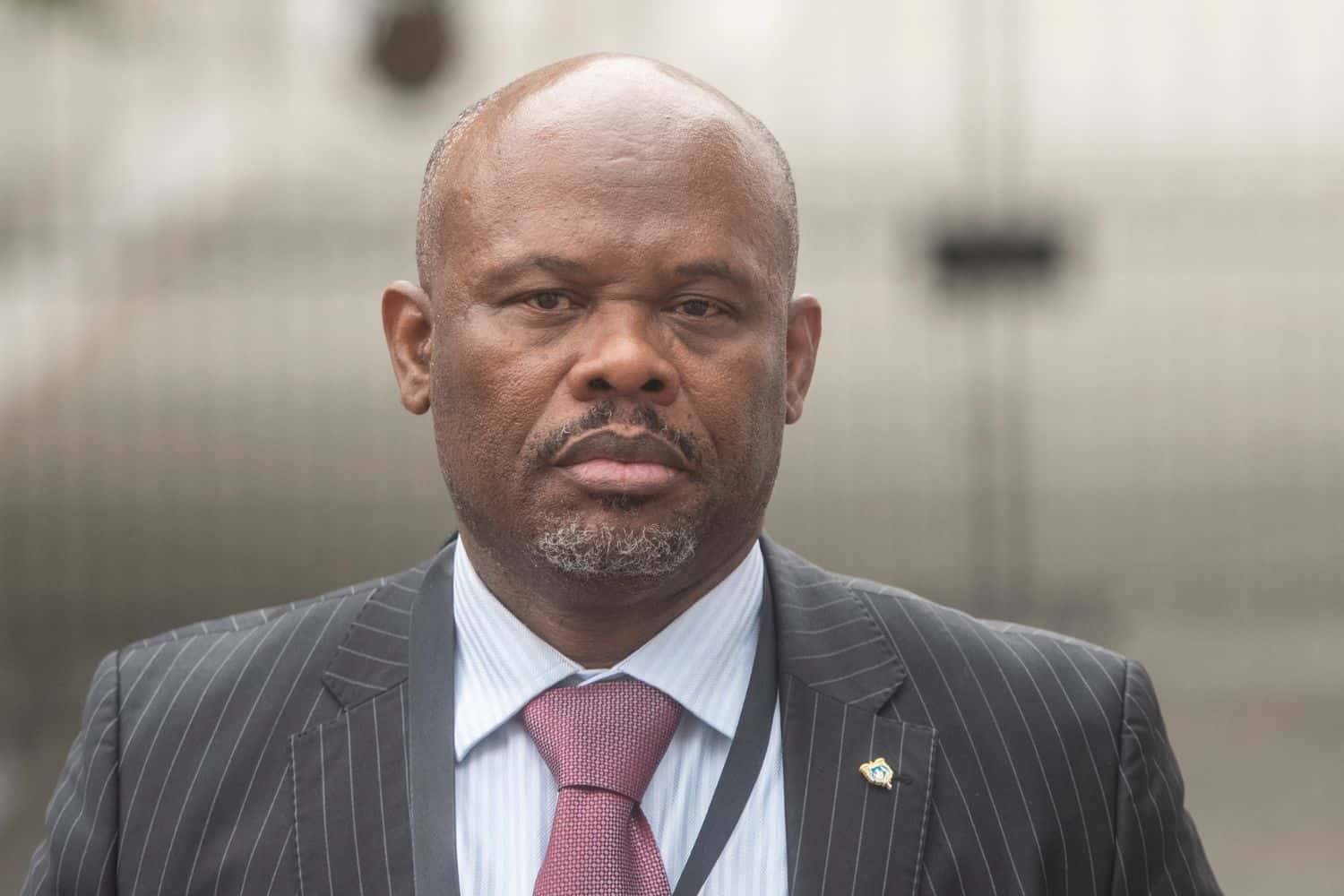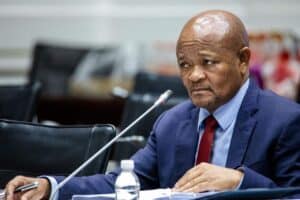'I used it to my advantage to make sure that I survive.'

Suspended Deputy National Police Commissioner Shadrack Sibiya says he was not troubled by the fact that an ordinary citizen possessed sensitive information.
Sibiya appeared for the second day before Parliament’s ad hoc committee at the Good Hope Chamber in Cape Town on Tuesday.
The inquiry is investigating KwaZulu-Natal (KZN) Police Commissioner Nhlanhla Mkhwanazi’s allegations of political interference, corruption, and collusion within the criminal justice system.
Sibiya testifies before Mkhwanazi ad hoc committee
On Monday, Sibiya testified about his role in disbanding the political killings task team (PKTT).
He claimed that even National Police Commissioner Fannie Masemola had agreed the unit was never intended to be permanent.
Its disbandment, Sibiya argued, was unrelated to allegations that he and Police Minister Senzo Mchunu wanted to shield a crime syndicate under investigation.
ALSO READ: ‘I will not resign,’ says defiant Sibiya as police raid his house
Sibiya also denied having personal relationships with alleged ANC member Oupa “Brown” Mogotsi and with Vusimuzi “Cat” Matlala, an attempted murder accused and tenderpreneur — both key figures in Mkhwanazi’s claims.
He further described how his working relationship with Mkhwanazi had deteriorated.
Questioning by MPs
On Tuesday, members of the ad hoc committee questioned Sibiya about his previous testimony.
ANC MP Thokozile Sokanyile asked about his tenure at the City of Johannesburg, where he had faced allegations of fraud and corruption involving R3.5 million in unlawful gratification and R580,000 in irregular expenditure.
“You left the City of Johannesburg under a dark cloud,” Sokanyile said.
Sibiya, who resigned from the City of Joburg in July 2022 to rejoin the police, said there was no case against him.
READ MORE: Madlanga commission: Mkhwanazi questions Sibiya’s promotion despite ‘questionable background’
He explained that the municipality was a political space rife with infighting and that some councillors opposed the Group Forensic Investigation Services (GFIS), where he worked, because they believed former mayor Herman Mashaba had created the unit in 2017 to target them.
He added that if there had been genuine evidence of wrongdoing, he would have been arrested.
“It’s how many years I have been back in the police, where’s that case now?” he asked.
Sibiya also pointed out that the Public Protector and the State Security Agency (SSA) had cleared him of allegations relating to his appointment as GFIS head and the procurement of spy equipment.
Sibiya on Brown Mogotsi
ANC MP Xola Nqola asked whether Sibiya considered himself a “rogue police officer”.
“I’ve never been a rogue officer in my 37 years in the police. I deny the allegations,” Sibiya replied.
Nqola pressed him on his relationship with Mogotsi, questioning whether it was appropriate for a civilian to provide him with Crime Intelligence information.
“No, it didn’t concern me because when someone comes to you with information that helps your cause, you do give attention to such information.
“I cannot be worried about the fact that this person is giving me information that says ‘watch over your back’.
“I used it to my advantage to make sure that I survive,” Sibiya said.
READ MORE: Sibiya explains how he knows Brown Mogotsi and Cat Matlala
On Monday, Sibiya testified that Mogotsi had warned him that Crime Intelligence was investigating him, though he was already aware of this.
He confirmed on Tuesday that he had communicated with Mogotsi “in general”, but not about policing related matters.
Sibiya also addressed his meeting with Matlala while serving as acting national police commissioner.
The meeting, he said, concerned Matlala’s now-cancelled R360 million Saps health services contract.
Watch the ad hoc committee inquiry below:
Sibiya maintained there was nothing improper about the meeting, explaining that Matlala’s alleged criminal involvement was unknown at the time and that he was an approved service provider.
“In this case, I take that even the national commissioner or any other person didn’t know.”
Sibiya also denied ever attending a meeting with Mchunu that was allegedly arranged by Mogotsi.
Disbandment of the political killings task team
Sibiya agreed with Nqola that political killings had decreased as a result of the PKTT’s work.
The task team’s disbandment was triggered by a 31 December 2024 letter from Mchunu to Masemola.
Sibiya said the decision to disband the PKTT was justified because Saps was transitioning toward specialised units capable of handling political killings and similar crimes.
He reminded the committee that the task team had already reported achieving its mandate, and he emphasised that resources were needed in other crime-prone areas such as Westbury and the Cape Flats.
“We are not saying the political killings task team must die.”
He said he was of the view that the PKTT’s functions be integrated into murder and robbery units nationwide so that its expertise could address related crimes such as taxi-violence killings.
“This is where they belong.”
Disbandment process
Sibiya previously told the committee he received an email about the task team’s disbandment on 3 January from Masemola’s office, while the 121 PKTT dockets only reached him in March.
He insisted that his instruction to send the dockets to Saps headquarters was merely to carry out the official order regarding the unit’s disbandment.
Currently, Sibiya faces a disciplinary inquiry for allegedly defying Masemola’s directive to phase out — rather than immediately disband — the PKTT, and for shelving case dockets.
Sibiya on Tuesday maintained there was only one official plan for disbandment.
He said that if his actions appeared to contradict Masemola’s instructions, the commissioner would have formally told him to pause the process while consulting with Minister Mchunu.
READ MORE: Sibiya wanted control of dockets ‘right from the beginning’ – Masemola tells Madlanga commission
Sibiya said his correspondence with colleagues clearly stated that PKTT cases should not be “disrupted or compromised” — a priority for both him and Masemola.
The letter, which he read aloud, also directed the creation of a temporary transition team and a comprehensive case-handover protocol.
It required informing all affected entities — including Crime Intelligence, the Hawks and the National Prosecuting Authority (NPA) — about the disbandment.
“Remember that General Mkhwanazi suggested that the NPA were not informed,” Sibiya said.
He stressed that his letter demonstrated every precaution had been taken to ensure PKTT cases would not “suffer”.
“There was a clear plan on the table on how to deal with this because political killings task team cannot live forever. It should not be a permanent structure.”
Case dockets
Sibiya explained that Crime Intelligence head Dumisani Khumalo was responsible for notifying internal and external stakeholders, as he managed the PKTT project.
“If it was me, it was going to be like I was forcefully disbanding [the PKTT], but mine was to communicate to the team that had to do it and giving them a roadmap.”
He said he was unsure whether Khumalo had carried out the instruction.
Sibiya added that the task team was still operational because Mkhwanazi claimed he was never informed of the disbandment, even though the plan had been signed off.
As deputy national commissioner for crime detection, Sibiya said he was accountable for case dockets.
“I’m expected to account for them, but they are not in my possession.”
He said the 121 dockets were removed from the PKTT after the decision for immediate disbandment and that Khumalo ignored his emails on Masemola’s instruction.
“General Khumalo would have never brought the docket to the head office because he already got instruction from the national commissioner himself that says ‘ignore that one’.”
NOW READ: Court dismisses Shadrack Sibiya’s application to go back to work






